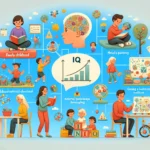### Understanding the Influence of Early Childhood Development on IQ
Early Childhood Development (ECD) is a crucial period in human growth that lays the foundation for intellectual performance, among other developmental outcomes. Research consistently shows that the first few years of a child’s life are a vibrant period of learning and development, influencing various aspects of their future, including their Intelligence Quotient (IQ).
When addressing the question of how early childhood development impacts IQ, we examine the interplay of environmental, biological, and educational factors that come into play from birth to the age of 8. IQ, a measure of cognitive abilities, often encompasses logical reasoning, problem-solving skills, and the ability to learn and apply knowledge.
#### The Role of Nurturing Environments
Environments rich in stimuli promote cognitive development. From birth, children are responsive to their surroundings; therefore, stimulating environments with educational toys, books, and interactive play can enhance the development of cognitive skills. Parents and caregivers who are responsive and engage in linguistically rich interactions contribute significantly to the bolstering of a child’s IQ.
#### Nutrition and Brain Development
Nutrition during early childhood plays a pivotal role in brain development. Essential nutrients contribute to neural growth, synapse formation, and brain plasticity, all of which directly influence cognitive capacity and IQ. Studies have found that inadequate nutrition can lead to developmental delays, impairing cognitive functions.
#### Early Education and Structured Learning
Structured learning experiences, such as preschool education, are instrumental in developing foundational skills for learning, including focus, memory, and critical thinking. Early education environments foster social and emotional development, which is closely linked to cognitive development, thereby influencing IQ.
#### Parental Involvement and Early Intervention
Parental involvement in early learning activities and consistent engagement in a child’s educational journey aids in cognitive stimulation. Early intervention programs for children with developmental delays or those from underprivileged backgrounds can mitigate adverse effects on IQ by providing support and resources that encourage learning and development.
#### Social and Emotional Development
Social and emotional maturation during early childhood can indirectly influence IQ. As children learn to navigate social interactions and understand emotions, they develop the effectiveness of communication and the ability to solve problems—key components of standardized IQ tests.
#### Interactions with Genetics
While genetics play a role in determining potential IQ, early childhood development is a period where environmental factors can significantly influence the expression of genetic attributes. The concept of epigenetics illustrates how external stimuli can impact gene expression, with early childhood experiences deeply engrained in the architecture of the brain.
#### Neuroplasticity and the Formative Years
During early childhood, the brain exhibits a high degree of plasticity, meaning it is particularly receptive to learning and change. Cognitive stimulation during this period can lead to stronger neural connections and improved intelligence. ECD that focuses on cognitive and sensory experiences leverages this plasticity to boost IQ.
### Conclusion
In summary, early childhood development plays a key role in shaping a child’s IQ. It is a multifaceted interplay of nurturing environments, proper nutrition, early education, parental engagement, and both social and emotional maturation. By addressing these areas, we can offer children the best opportunities to reach their cognitive potential and positively influence their intelligence quotient, opening doors for future academic and personal success.

